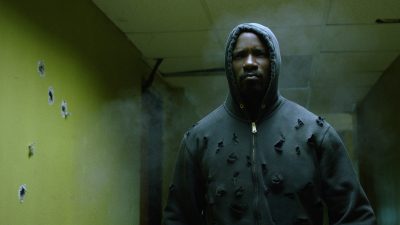
First Captain America from Brooklyn, then Jessica Jones and Daredevil from Hell’s Kitchen and Spider-Man from Queens. Now, Marvel has another New York superhero gracing the screens — “Luke Cage,” starring Mike Colter in the titular role. He’s Marvel’s “first and foremost black superstar,” as he was known in the comics.
“Luke Cage” differs from Marvel’s other superhero plots mainly because his story doesn’t begin or even revolve around his powers — indestructible, bulletproof skin, as well as super-strength and healing. Luke wasn’t born with his powers, nor did he gain them voluntarily. More importantly, Luke was already a complex, well-rounded character before the powers.
Luke wants to live a quiet life, working two jobs as a sweeper at Pop’s (Frankie Faison) barber shop and a dishwasher/bartender at the Harlem’s Paradise Club, in order to leave behind his past as a convict imprisoned for a crime he didn’t commit.
This peaceful day-to-day life is interrupted when two customers of Pop’s intercept an arms deal gone sour, bringing about the wrath of the Harlem’s Paradise’s owner, the ruthless weapons dealer and businessman Cornell “Cottonmouth” Stokes (Mahershala Ali). Luke gets caught in the middle of a story of revenge, power and justice, which reveals clues to the origins of his powers and the very future of Harlem itself.
Luke also has detectives Misty Knight (Simone Missick) and Rafael Scarfe (Frank Whaley) on his tracks, meaning Luke is going to have a lot to deal with on his path to freeing Harlem from danger.
Colter’s Luke Cage is perhaps the deepest and most human of Marvel’s superheroes — there is no thirst for blood or revenge, but rather a need for justice. Luke is also respected and loved in his community, which is a breath of fresh air from heroes so rich that they are detached or just hated.
Colter’s superb acting makes Luke a dimensional character who doesn’t just barrel through criminals with his powers, but rather actively tries to find ways to make Harlem less corrupt.
Misty Knight is just as determined, albeit through different means — she sees Luke as a vigilante who shouldn’t be stopped, but rather discouraged, lest he starts what she calls “World War III” between him and Stokes.
Given how complex and amazingly well-written the show’s main character is, it would be difficult for the rest of the cast to catch up with him, right? Absolutely wrong. Every single secondary character is given just as much backstory and development as Cage, each not just contributing to Luke’s story but rather bringing in their own, making one plot woven from many, much like the diversity of Harlem itself.
Be it Pop’s origins as a gang enforcer into an honest barber, local chess-master Bobby Fish’s (Ron Cephas Jones) ties to Pop and Luke, or how all characters are tied to Stokes’ control of the neighborhood, all the stories are crucial to the overarching plot.
Rounding out the cast, Ali’s is just as complicated as Luke himself. Ali describes Stokes as not an antagonist, but as “the other hero of the story.” Stokes wants to continue the legacy of African-American culture in Harlem, but does so through illegal means by funding it with arms trafficking.
The conflict, then, doesn’t stem from a hero wanting to maintain a status quo that is disrupted by the villain. Both Luke and Stokes want peace and progress for Harlem, but their methods cause their paths to cross and add fuel to the battle between them.
Above all else, “Luke Cage” is not just another superhero story, but one that American television has needed for a long time: a story that revolves around African-American culture and characters, but not presented with themes of “Us vs. Them.”
There are no white-written caricatures, but instead a profound respect for the African-American communities of Harlem and all around New York. The story, characters, soundtrack, setting and plot of “Luke Cage” are complex, well-rounded and diverse.
This isn’t a superhero who just happens to be an African-American. From the start, even from the comics themselves, Luke Cage is a superhero whose very essence, struggles and quest as a hero, come from his struggles as an African-American. The show doesn’t turn race into a hot topic, but instead makes it so essential to its plot and characters that the topics surrounding it are presented and dealt with naturally and respectfully, unlike the more ham-fisted delivery of the source content.
And deep down, while America enjoys the scrawny kid from Brooklyn turned into a super-soldier, or the nerdy boy from Queens turned into a web-slinging jokester, it needed to see the African-American hero who fights for the rights of those around him. Luke Cage is the hero who goes after injustice in any form, the hero who is indestructible, immovable and invincible against bullets. America needed “Luke Cage,” and it certainly delivered.
























































































































